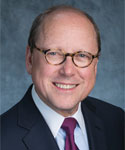![]() As senior member and managing partner of the largest private practice rheumatology group in the country, Herbert Baraf, MD, FACP, MACR, says his journey to physician management has been more about following an interest than a career path.
As senior member and managing partner of the largest private practice rheumatology group in the country, Herbert Baraf, MD, FACP, MACR, says his journey to physician management has been more about following an interest than a career path.
“It takes an analytical mind, good intuition, fear of failure and the application of common sense to make the decisions that dictate the success of your practice,” says Dr. Baraf, who practices at Arthritis and Rheumatism Associates with offices in Washington, D.C., and Maryland.
He notes that an important part of this analytical and balanced approach comes into play when choosing the people who will lead with you. “Having a good staff and staff leadership is critical because you do everything through management and managers—respect the hierarchy of your staff and the unique skills they bring to their roles.”
Of course, he adds, the skills and objectives to lead in private practice are unique. Dr. Baraf learned this as a young clinician just settling into his first practice position. The leadership changed, and he was asked to handle key aspects of the business side of the practice.
“I began to realize that management has a great influence over the quality of practice. Each point in a patient’s experience, including greetings from the front desk and discussions around payment and insurance, were just as important to focus on and get right as the excellent clinical care we provided,” Dr. Baraf explains. “The ability to serve your patients is not just about clinical care, but also the business decisions made to ensure the financial success of your practice.”
Know Your Strengths & Weaknesses
Looking back on his 39 years as a rheumatologist, in which most of his tenure has included a leadership role, Dr. Baraf shares his top five skills that rheumatologists considering physician management roles should develop:
- Be a good clinician and earn the respect of those you work with;
- Have a genuine interest in how the business of a practice works. Be willing to look “under the hood” at how business practices, such as handling delinquent payments, are managed;
- Find a good balance between being risk averse and open to opportunities and ideas that are worth the gamble, particularly as healthcare continues to change;
- Try to be selfless in building consensus, because you have to consider your views on a situation in addition to other stakeholders who are likely to be a mix of risk averse and risk takers. It’s your job to find the balance; and
- Have guiding principles that dictate how you feel about the success of your practice. You need to be able to evaluate threats in a sanguine, unemotional way and determine your best response—whether the threat is from an insurer who has cut reimbursements or from not being a computerized practice when all the incentives and a lack of penalties are for practices that are computerized.
Advocate for the Profession
Whether or not rheumatology physicians are interested in management, Dr. Baraf believes every physician must be keenly aware of the political changes and activities that can drastically affect their practice, for better or for worse.
“The mandates and regulations that impact our practice can make or break us as individual clinicians and as members of a practice,” he stresses. “It takes strong engagement to understand what is happening, and it takes perspective to see what might be coming from governmental decisions so you can be nimble and also flexible in order to accommodate your practice to succeed through change.”
Carina Stanton is a freelance science journalist based in Denver.


